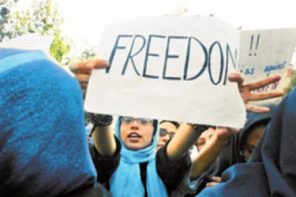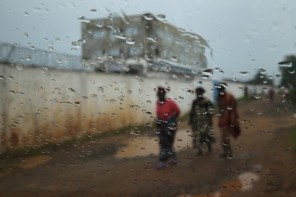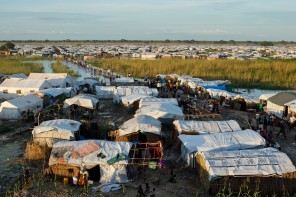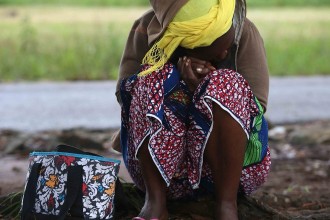Tom over at aviewfromthecave offers a critique of a recent Washington Post article about a couple, the Hughses, who went on safari in Tanzania and then decided to start a bike charity for residents of Karatu, a village near the safari site where the couple stopped at a local school and learned the kinds of things the rest of us yawn about knowing: that there’s no power; that the kids walk forever and a day, barefoot, to get to school; that they have to fetch water on top of that… Etc. For this the Hughses, though, that’s new knowledge. And I think we’re allowed to be patient about that.
So over in the cave, the critique basically goes, “WTF? This article is terrible, missing all kinds of follow up question sin Tanzania, and this bs should not continue to pass through editorial gates.” A friend and fellow expat-in-Africa journalist had sent me the same article and said, “WTF? I can’t believe this stuff gets printed.”
Well, yeah, okay, it’s not a great article. But it’s worth taking a minute to notice what kind of article it is: It’s a piece in the “local living” Sunday features section, written from Loudon, Virginia. I bet more of you reading this blog could find Karatu on a map before Loudon, Virginia. That means that it’s written by a surburban reporter who, if she’s anything like most of the reporters cast out to the suburbs whom I know, is kind of bored and looking for anything slightly more interesting than the county sanitation meeting. The other thing I know about covering the suburbs is that editors like profiles of locals, especially ones doing nice things, and especially for the Sunday paper. There’s a journalism structure at work here.
So is it an article that fails to do all kinds of important development aid stuff? Yeah. But that’s not the kind of article it tries to be, and I don’t think it’s fair to trash it for that.
I’m actually bringing this up because I think this media critique is symbolic of the other critique, which takes second fiddle in the cave to the media critique in this case but is actually part of a lot of discussions over there: What’s the right way to do aid, development, charity?
There are a lot of super-smart people whose blogs I read who are thinking about structures and systems in regard to this question, and that’s important. But what can get lost in the typical aid critique, like the typical media critique, is the meaning of the kind of thing the Hughes’ tried to do.
They’ve bought 45 bikes to help kids get to school. Karatu has 700 kids. Obviously there’s an imbalance here, and there are all kinds of questions to ask about that. But does the fact that that’s all they can do mean they should do nothing?
I think a lot about the problem of expectations, mostly because I think a lot about peacekeeping. If all you can do in the middle of a war zone is send a minimal number of troops authorized to do basically nothing, then no, you don’t send them, because the expectation on the other end is too outsized, and the stakes are too high.
I’m sure the kids without bikes are disappointed. But they’re not going to die. And if the Hughses can add another 45 bikes, and then another, etc, more power to them. And while Tom outlines a cynical “likely” scenario of what happens when the bikes get dispersed, I think it’s equally likely that the kids share bikes; that families use them to help each other. I think this because I’ve seen it happen, over and over again. My experience with communities in extreme need is that they share the remedy someone offers them, even if that remedy is limited. Not always, and not always without problems, but that’s what I’ve seen.
I actually think this is apropos to the Congo minerals debate, and the question of advocacy in general. We’re all struggling to answer a question that we haven’t had the possibility, or the responsibility, of asking before. All of the typical cliches of the age — think the Internet and globalization — mean we can and must ask about our responsibility to and for people we will probably never meet, in part because what we choose to do with our lives, or more to the point with our money, will affect them.
We’re still figuring this out. After my last post, one advocate sent me an email and said, “We are well aware that we are not the whole ballgame but we are trying to convince the American public that they can be part of the solution to ending these crises.” I think that’s important. And I think that people who are determined enough to be part of a solution to anything — from the crises in Darfur and Congo and beyond to getting bikes to kids in Tanzania — deserve to be taken seriously. How do the rest of us help leverage what those with good intentions want to, and clearly simply will, do?
One more thing: At a certain point, the Hughses decision to send bicycles to Tanzania, or the private decision of dozens of expat workers I know in countries in the Great Lakes who send the children of their guards, their house help, of their friends to school, or who pay the university fees for a friend who’s an orphan of war, or who volunteer tutoring children in English or math… These are decisions that are fundamentally about human relationships. They are an expression of something; I won’t presume to label it, as I think it’s probably also very personal. When I did this article about tourism in the Millennium Village in Rwanda, I started with Tom’s skepticism, and with a host of intellectual objections to the enterprise. I was surprised to find them challenged by the very real connection that the people in the village felt with the tourists, who stayed in touch, sometimes even sending pictures and small gifts. For the Rwandans there, it was very real. And for the tourists who bother trying to get a framed picture of a farmer from Sydney to Nyamata, one presumes it’s equally real.
I’m all for aid and media critiques; I’m all for all of us asking for better foreign policy, better interventions, better conversation — and by better, I mean things that make a tangible, positive impact on the lives of the people on whose behalf we are moved to thought and action. But I’m also for acknowledging that there is meaning and importance is the small-scale human endeavor. It may not be perfect, but I think it’s based on exactly the kind of human connection we’re all hoping might the basis for change.
UPDATE:
Tom confirms his name is Tom, which I thought but suddenly couldn’t remember as I typed — does that ever happen to you, and then you just don’t use the person’s name and hope they won’t notice? Yeah. So I’ve changed my impersonal references to personal ones and apologize for being a moron.
I also bolded a few things to help a weary reader along. Sometimes my blog posts are longer than articles I’m allowed to write. Maybe the bold helps? Maybe it looks stupid? Not sure. Experimenting.
Tom and I have had some banter about this, which culminated in a new post of mine here, and in which you can find links to said banter.





being one who can get caught up in the critiques and perpetual spiral of despair around international development and its ineffectiveness, this post was a breath of fresh air and a reminder that yes, most people who want to DO SOMETHING, come at from the perspective of their own human relationships and not the broader, macro picture that those of us hoping to fix the system come from. and sometimes, that is just the reminder that we need.
Thanks, Lu. I’m among the last people someone would confuse with an optimist on this issue, but yeah, sometimes a breath of fresh air is important. I’m glad if this does a little of that. Thanks for leaving your comment.
One thing that people in the more affluent countries can do, in terms of development education, is to spread the word about the Millenium Development Goals.
A good way to do that is to host viewing party & discussion after of TEDxChange on Sept 21.
http://www.ted.com/pages/view/id/446
Thanks for the name update! More importantly, thanks for your reflections and the willingness to call me out where I made major mistakes. I encourage your readers to check out your new post as I think it brings out some really interesting questions that seem to form a large part of the base which brought about this discussion.
Also, no worries about your quick summary. I got a good laugh out of it.
Tom
Well, y’know, it depends. Giving a minority of poor kids a big gift is almost always a bad idea and breeds resentment – as I have observed in non-developing country contexts. And generally it is pointless, as one could just save up the money over an extended period and buy all the 700 kids a bike. Or the alternative is distributing them by some other measure (perhaps distance from the school or something).
Good intentions aren’t enough – when your personal/collective need to feel a buzz of doing ‘good work’ outweighs the benefits or problems associated with the donation, serious questions have to be asked.
Thanks for the rebuttal, Jina. As Kristof noted in the Youtube question on Africa coverage (see nytpicker and Bronstein discussions), the identifying bridge character is often the only way you can engage more than the usual readers in your story, and of course, that’s the only way most editors would ever agree for this kind of story to be printed in a (local) paper. If Kristof has this issue and thinks its necessary to get people to read that these issues exist, then so will every other mainstream newspaper.
Could Caitlin Gibson, once she grabbed readers’ attention, have done more to present and describe the education sector in Tanzania or the region? Perhaps. But if you look carefully at the article, it completely lacks any negative frames about ‘abject’ poverty, violence, corruption, etc. It probably has done the country a greater service by writing about safaris and happy (if blissful) travelers who keep coming back for more every year.
Hey Tino (to whom I owe an email!) — that’s a great point about the article avoiding the usual negative frames. Maybe safari numbers will go up, which means dollars int he local economy, which means…
Kristof’s got a problem in that his “identifying bridge character” always has to be white, and I’m not down with that, but we’ve had that debate here ad nauseam… On the other hand, in the local news section, this couple makes sense as an identifying character, I think. Is this the Platonic ideal of covering Tanzania? No. Can we fault it for that? Don’t think so.
Great to have you reading along, so I can leech off your smart brain 🙂